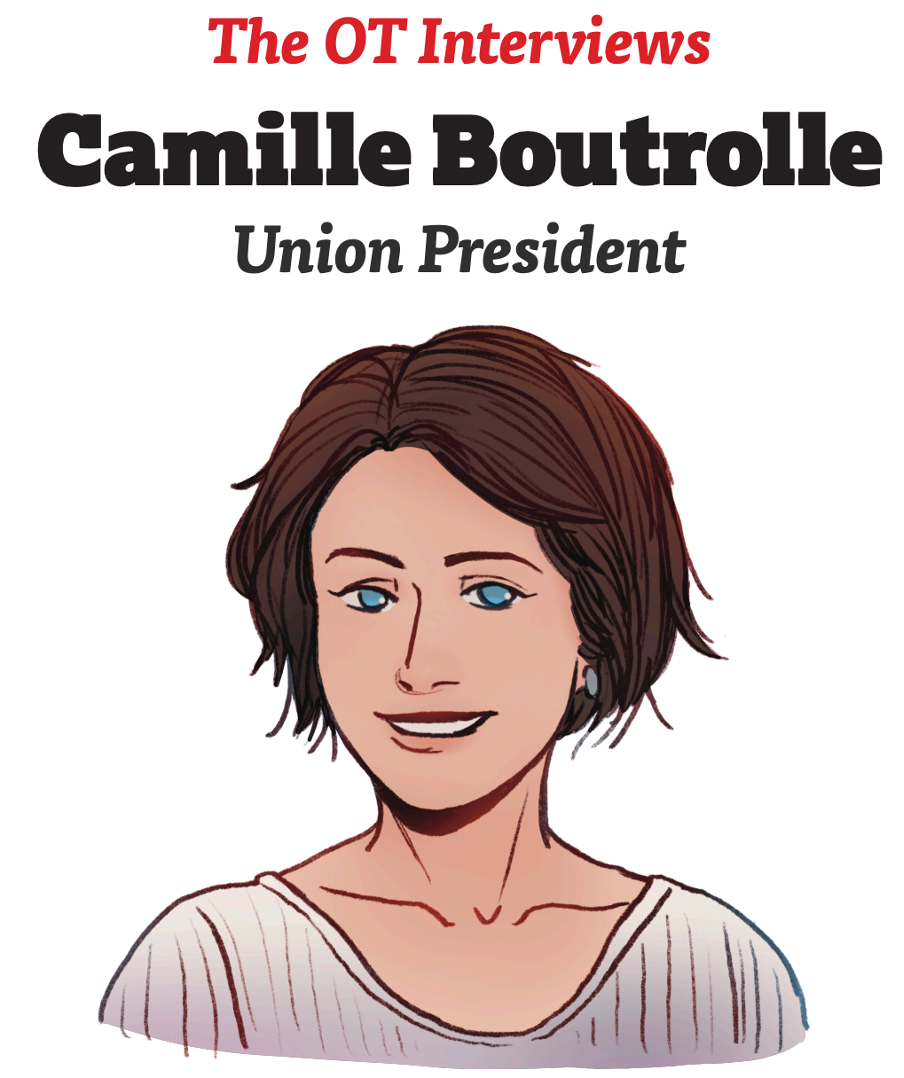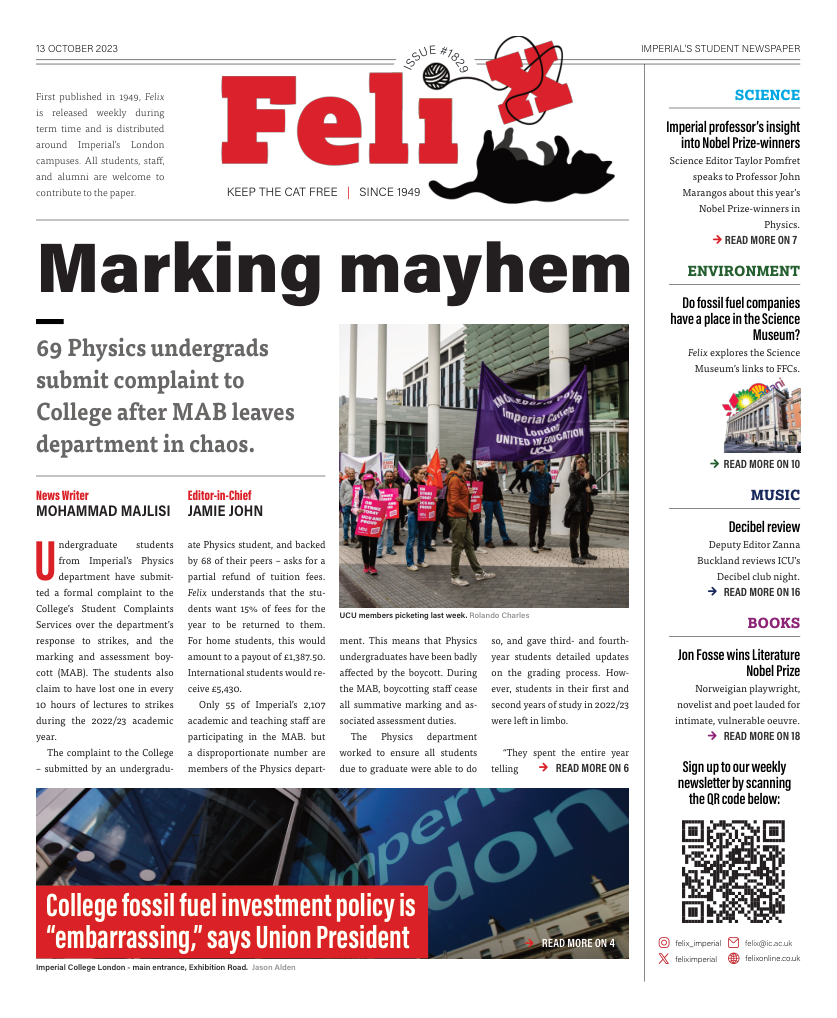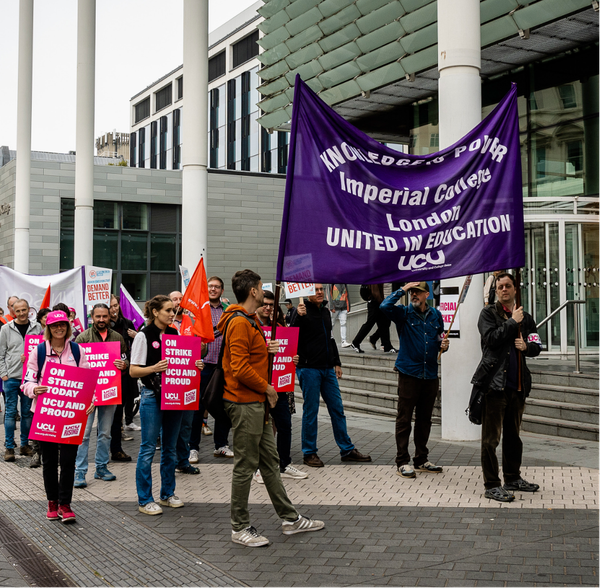The OT Interviews: Camille Boutrolle
In this series, Felix talks to the Union's Officer Trustees. First up: Camille Boutrolle, Union President.

This time last year, Camille Boutrolle had just completed a four-week summer internship with EY’s Corporate Finance division, and was weighing up her options. She held a return offer from EY, but wanted some more time to mull over things.
“You’re seeing people go off to do internships with these huge banks, and there’s this notion of associating jobs at these companies with success,” she tells me when we meet in late September. “I was intent on doing a gap year to sit back and figure things out.”
It was around this time, Boutrolle says, that she started to consider running for a position as an officer trustee (OT) of Imperial College Union (ICU). “My experience at Imperial was really fulfilling, and I don’t think everyone has that, so I wanted to try and change things,” she explains.
The Union is run by five Officer Trustees and a team of permanent staff. The Officer Trustees (OTs) are elected representatives of the student body, who take a year out of their studies to lead Imperial College Union.
There are five OT positions: four Deputy Presidents, responsible for specific aspects of the student experience, and one Union President. The President is ultimately responsible for the Union, and also sits on College Council, meeting regularly with senior Imperial staff and acting as the voice of the student body.
Boutrolle wasn’t particularly familiar with the Union, she admits – her experience of the institution was through Imperial’s sports clubs, having held committee positions on a number of them.
The natural role for her, given her experiences, was Deputy President (Clubs & Societies). She spoke to Dylan Hughes, then holder of the position. “I realised he was having a tangible impact on the student experience. He really sold it to me.”
Soon though, Boutrolle realised that her interests didn’t fall into the Clubs & Societies portfolio. “I came from a background in South London where I wasn’t privately educated, and felt quite underrepresented when I came to Imperial. I also did an engineering degree with a very poor female to male ratio, so outreach was something I really wanted to work on.”
“Also, in my fourth year, one of my good friends was heavily involved in Imperial Climate Action [ICA, a student advocacy group whose mission is ‘to work with the College to encourage sustainable policies that are environmentally and socially responsible’]. It opened my eyes to the fact this is something that isn’t really going away.”
Boutrolle attended one of ICA’s lunchtime meetings and was inspired. “I thought, ‘Yeah the Union needs someone who really cares about sustainability.’”
“I love sports and that was a huge part of my undergrad degree, but there were bigger things I wanted to change.”
And so, she ran for President.

“It’s embarrassing”: ICU President delivers stark rebuke of College fossil fuel investment policy
As Union Presidents go, Camille Boutrolle is atypical. Last academic year, Felix compared her resume to those of her predecessors; every one of them for the past six years has served as a constituent union president (representing scientists, engineers, medics or business students) before taking up mantle of ICU President.
Throughout our conversation, she is candid about her lack of experience. “I was never involved in Union Council, any of the constituent unions – none of that. I was a year-group representative one year for my course, but that’s about it.”
Boutrolle’s inexperience is evident in some of her manifesto pledges. A plan to make microwaves and other amenities widely available across campus drew ridicule from some quarters; it is a stark contrast to the legislative goals put forward by previous ICU Presidents. But, she says, “I’ve got so much support for the idea – Estates [responsible for College facilities] are already on board.” Some might describe the plan as low-hanging fruit, but Boutrolle would likely point out that she is the first to pluck it.
“People would still laugh at me now about that,” she acknowledges. “But in my final year, I lived with a girl doing a postgraduate taught degree, based in Hammersmith and White City. The amenities at Hammersmith are just awful. It feels like sometimes the South Ken campus is prioritised because that’s where senior management is, and I wanted to reform that.”
“It’s all well and good talking about big things that don’t affect students that much now, but what’s going to make a tangible impact for students who are currently here?”
In total, Boutrolle has four goals for the year:
- Amenities (such as microwaves) readily available across all Imperial campuses.
- ‘Striving for a top-50 ranking in the People & Planet league tables.’
- Further outreach programmes to diversify Imperial’s population.
- A potential ‘cross-register’ scheme with LSE, and more IDX opportunities [in which students can study modules from other degree courses].
She admits she has overreached with the ‘cross-register’ proposal, in which students at Imperial would be able to register for courses at LSE, and vice versa. Students are not yet able to register for modules on other degree programmes at Imperial; Boutrolle says she needs to address this first.
In total, Boutrolle has four goals for the year:
1. Amenities (such as microwaves) readily available across all Imperial campuses.
2. ‘Striving for a top-50 ranking in the People & Planet league tables.’
3. Further outreach programmes to diversify Imperial’s population.
4. A potential ‘cross-register’ scheme with LSE, and more IDX opportunities [in which students can study modules from other degree courses].
She has also found that Imperial is already developing further outreach programmes (goal 3). “I’ve realised that actually the most important thing I can do here is work on the Access and Participation plan, because it’s something they legally have to produce, and have to stick to – so it’s quite impactful.”
The Access and Particpation plan aims to increase admissions of underrepresented students and close attainment gaps between students from different backgrounds. The Office for Students requires universities to have such plans if they want to charge above the basic tuition fee cap – which Imperial does.
Of her four goals, Boutrolle speaks most passionately about her sustainability pledge (goal 2). Specifically, she says she wants Imperial to divest its money out of fossil fuel companies.
Imperial says it will continue to invest in fossil fuel companies which are striving to meet Paris Agreement targets. But Boutrolle is unequivocal: “We’re supposed to be a world-leading institution. We literally have research on the effects of climate change, and we’re investing in these companies. It sends the wrong message and downplays all the good work we’re doing.”
“You need to lead by example when you’re Imperial. We need to be sending off our graduates with the right attitude towards climate change.”
The College argues that its investments allow it to have a longer-term influence on decarbonisation than divestment would. Boutrolle dismisses this position. “I just don’t think that’s the role of Imperial – it’s a research institution, not an investment firm. And there are better companies out there actually trying to make a positive change and not just offset their use of fossil fuels. Imperial is one of only a few Russell Group universities that still hasn’t divested from fossil fuels – it’s embarrassing.”
Boutrolle intends to use her position as the student voice in Imperial’s corridors of power to show that students want change. “Imperial hasn’t – until recently – really cared about this,” she says. “I do think they genuinely care about student experience, so we just need a voice in that room where decisions are made raising the issues people want to speak about.”
She has already started talking to environmental charities, and says she will be speaking to People & Planet – the charity referenced in her goals – the following week. She tells me that one easy way Imperial can move up People & Planet’s sustainability league tables is by better reporting its existing initiatives.
“It’s been a steep, steep learning curve,” says Boutrolle, when I ask about how she’s found the role so far. “When I started, I was learning not only how the Union ran, but also how the College worked, and how the two worked together simultaneously.”
The ICU President effectively has two roles: they serve as the political figurehead of the student body, and also, as the CEO of Imperial College Union, a charity with an annual turnover of £10m.
Boutrolle seems to have thought extensively about lobbying the College, but not so much about her position at the head of the Union. “When I was running, the former was definitely my view,” she says. “I thought of my manifesto points, and then that I’d get elected and figure it out later – the ‘CEO’ part is something I’ve become aware of since I started.”
“The Union’s permanent staff have been very supportive in helping her with this, and have the expertise to help on the operational side of the role.
She says she works harder now than she did during her Aeronautics degree. “If I’m not having any impact here, it just doesn’t sit right. Whereas with my degree, I could be guilt free about a lot of it.”
Boutrolle believes the biggest challenge facing the Union is engagement with Imperial’s international student community. Imperial’s most recent annual report showed that EU and international students make up half of the student population. Chinese students alone account for a quarter. “I don’t think the Union represents that at all,” says Boutrolle. “It’s two-fold: we don’t represent them well because we don’t get the engagement, but we need to work on getting that engagement, so that we understand how best to represent them.”
How should the Union address this challenge? “I don’t have a whole solution yet, but I think by leveraging people’s experiences.” Boutrolle notes that two ICU Deputy Presidents Yi Yang and Stephanie Yeung – are international students, and says she wants to use their insights. “I also feel bad when all international students are grouped into the same bucket – growing up in China is very different to growing up in India, which is different to growing up in Nigeria.”
“This is a business model – ‘home versus overseas’. We need to understand who our students are and how we can help with their issues – like are there visa issues? Or for example, if you’re from a former colony like India, you can vote in the general election – do people even know that?”
And finally, what would she suggest to anyone who wants to run for her role next year? “Talk to me. You want to know exactly what you’re signing up for, and how to best prepare for that. For example, I wish someone had told me what Union Council was, and that you could just rock up. You can just sit in, observe, and understand.”
“Also, I got scrutinised a lot on the fact that I didn’t have the necessary experience – especially by Felix. Sometimes it’s not about how much you know, but whether you can bring the fresh perspective. It’s important not to have constituent union presidents roll into Union President. I don’t feel those people always have a real feel for what students want. Yes, I’ve had to learn a lot in a month and a half, but now I have the knowledge, I can do things a bit differently.”








